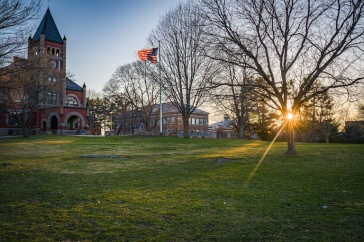
Terry and Jean Jones (center) with their family
“Be good to the land and the land will be good to you.”
That is the credo that has guided every decision made by Terry and Jean Jones, both UNH Class of 1969, related to their thriving farm and winery in Shelton, Connecticut.
Spoken more than 150 years ago by Terry’s great-great-grandfather, Philip James Jones, it is engraved in a large natural stone monument on the Jones’ property. Terry and Jean’s enduring commitment to this belief is one of the reasons The Jones Family Farms and Winery was recently selected to be the 2023 recipient of the Sand County Foundation’s New England Leopold Conservation Award.
“Terry and Jean are stellar examples of our alumni aligning their intellectual curiosity and capacity with their commitment to land and community,” says Anthony S. Davis, dean of the College of Life Sciences and Agriculture, where Terry and Jean both earned their degrees. “Recognition with this award is so well deserved and will only help others see what can be done to positively grow local agribusiness in New England.”
Like the four generations who have worked its fields and forests before them, Terry and Jean Jones have a deep respect for the landscape and the more than 500-acre farm and winery enterprise that they now run with their grown children.
Terry traces the origin of his conservation ethic to his childhood, working on his family’s farm — then a dairy farm — alongside his father and grandfather. An avid gardener in his teens, he sold vegetables on a card table to families coming to their farm to buy raw milk. The proceeds from his produce sales helped pay for his tuition at UNH, where he met Jean.
In the 1960s, Terry’s parents sold the dairy herd and moved fully into Christmas tree production, pioneering the now popular cut-your-own experience for customers. For his part, Terry, while still a student at UNH, added pick-your-own strawberries to the farm’s offerings and from there, with Jean by his side, the operation grew to include blueberries, vegetables, pumpkins and more land in the decades that followed.
Terry also credits the time he spent at UNH with influencing his success as both a farmer and a conservationist.
“UNH laid a firm foundation for my belief in following the road of lifelong learning,” he says. “I was inspired by several professors, even outside my forestry and plant science major. Members of the UNH community have been mentors and helped me grow our business and lead a fulfilling life.”
It was also at UNH where Terry met the love of his life, a nutrition and food services major, Jean Crum, whom Terry describes as “not only a splendid mother and grandmother, but also a wise and trusted business partner.”
Under Terry and Jean’s stewardship, the farm continues to very much be a family affair. Twenty years ago, their son Jamie started an award-winning vineyard and winery on the farm, and his wife, Christiana, brings her hospitality expertise to all farm guest experiences. Terry and Jean’s daughter, Gwyn, creates the farm and winery logos, wine labels, farm publications and packaging for special farm products.
In 2009, Jean, who earned her master’s degree in public health from Yale University and is a registered dietitian and community nutritionist, opened the Harvest Kitchen on the farm to make farm-fresh food products and offer cooking classes focused on the joys of cooking with seasonal fresh, local ingredients.
Now Jackson Jones ’27, Terry and Jean’s grandson and part of the seventh generation of Joneses, is a sustainable agriculture and food systems major at UNH and is preparing for his own role in the family business.
“Living on my family's farm, I grew up thinking everything they did was standard agricultural practice,” he says. “I did not realize that they were innovative leaders in conservation until I left my small agrarian bubble. It made me want to follow in their footsteps which is why I decided to major in sustainable agriculture and food systems at UNH. After I get my degree, I plan to return to my family's farm to continue their extensive work in sustainable agriculture and the preservation of farmlands.”

Terry and Jean say having their grandson at UNH has opened a “floodgate of memories.”
“The campus is beautiful with its many brick buildings sited among the leafy woodlands,” Jean comments. “I enjoyed living in Smith dorm for three years — it had character, grace and a fine bunch of friendly women. I was fortunate to have had some fun part-time, on-campus jobs — as a waitress at the President’s house and for special MUB events, a university tour guide, a food supervisor at Stillings Dining Hall, and a resident assistant. I also learned to ski and ice skate, did Scottish dancing in “Brigadoon,” and fell in love with the lakes and mountains of New Hampshire.”
A strong history of conservation
At the farm, Terry has honored his great-great-grandfather’s credo, and the work of his father and grandfather before him, by adopting conservation practices that have produced high quality crops while benefitting the environment. He says better yields are a dividend of properly caring for the land.
Terry’s great grandfather encouraged his father to fence off steep slopes and rocky pastures to plant trees, and the areas have since produced more than five rotations of Christmas trees. Terry’s father experimented with innovative erosion control by incorporating a cover crop of winter rye into unharvested corn fields 75 years ago — long before it was common practice.
Steep, rocky slopes where mowing is unsafe are treated with low rates of herbicides to suppress weeds, resulting in a diverse mix of herbaceous flowering plants that provide habitat for pollinators and other beneficial insects, while stabilizing soils. Native wildflowers flourish in the soils among the evergreens and along old stone walls, to encourage bee and butterfly populations.
The early adoption of crop rotation and cover crops to replace soil fumigation where strawberries are grown is another example of the Jones family using the best available science to improve ecological sustainability. Soil health improved, common root diseases were suppressed and strawberry plants lasted longer. In addition, thousands of tons of wood chips are composted annually to amend the soils around berries and Christmas trees. Pick-your-own pumpkins were added to the plant harvest mix in the 1980s to increase crop diversity and the farm’s income.
As to offering advice to the next generation of growers, Terry and Jean agree there is no substitute for simply diving in and getting your hands dirty — literally.
“Go live and work on a farm for a couple years and see if you can handle the relentless schedule of caring for plants and animals,” advises Jean. “If you still love the work and lifestyle and want to continue, agricultural mentors are available and will help guide you onward.”
When it comes to being agricultural mentors, Terry and Jean have done their part. Each generation has, as Terry says, “tried to leave the wood pile a little higher than they found it.” Jones Family Farms is a frequent host of school tours and research trials. Terry has advocated for farmland preservation and environmental causes by chairing Connecticut’s Working Lands Alliance, a project of American Farmland Trust. He also led local efforts that protected more than 1,000 acres of farmland and forests and helped secure 30 miles of public recreational paths throughout Shelton.
While Terry hopes the 2023 Leopold Conservation Award will inspire and instill pride in future generations of the family, there are no plans to rest on any laurels.
Jean says she’s now working on organizing generations of saved family paper artifacts for a Jones Farm archive. “I plan to write some booklets with stories about our farm as well as assemble farm recipe handbooks that focus on using our seasonal harvest crops,” she says. “If I live long enough, I would love to create a small family farm museum with all the stuff that has been set aside in various nooks and crannies of barns for more than 150 years.”
As for Terry, he plans to continue supporting and enabling the next generation of Joneses to continue farming, should that be what they choose, he says, and to continue enjoying his lifelong relationship with the land that has yielded not only a thriving family business but also a deep sense of pride and gratitude.
Given in honor of renowned conservationist Aldo Leopold, the prestigious Leopold Conservation Award recognizes those who inspire others with their dedication to land, water and wildlife resources in their care. Winners receive $10,000 and a crystal award for being selected.
Presented by the Sand County Foundation and nationally sponsored by American Farmland Trust, the honor is given to private landowners in 27 states for extraordinary achievement in voluntary conservation. The New England Leopold Conservation Award is made possible through the generous support of American Farmland Trust, New England Forestry Foundation, Sand County Foundation, Farm Credit East, David and Ann Ingram and the Yale School of the Environment.
-
Written By:
Sarah Schaier | College of Life Sciences and Agriculture




















































